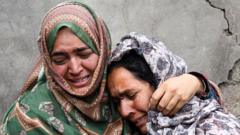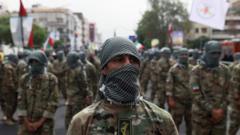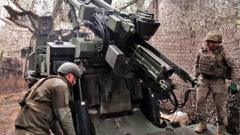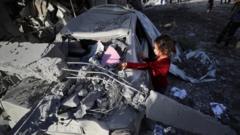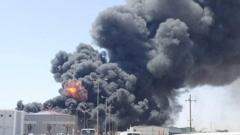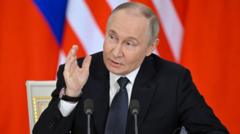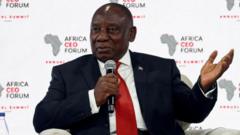Ukraine is set to send a delegation to Istanbul for peace talks, but President Zelensky voiced concerns over the Russian delegation's seniority. US leaders, including Marco Rubio and Donald Trump, believe that breakthroughs will only come from direct interactions between Trump and Putin. The upcoming talks come amid ongoing hostilities and calls for increased pressure on Russia.
Ukraine's Participation in Peace Talks Raises Questions Over Delegation Quality
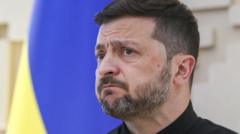
Ukraine's Participation in Peace Talks Raises Questions Over Delegation Quality
Ukrainian officials express skepticism about Russian commitment to peace, while US leaders suggest high-level meetings are essential for progress.
Ukrainian President Volodymyr Zelensky has confirmed that Ukraine will dispatch a delegation, led by its Defence Minister, to Istanbul for peace talks with Russian representatives. Despite the confirmation, Zelensky raised concerns regarding the seriousness with which Russia approaches these discussions, emphasizing disappointment over the "low-level" nature of the Moscow delegation. The head of this delegation, presidential aide Vladimir Medinsky, countered that the Kremlin team possesses "all the necessary competencies" for the negotiations.
The talks come at a crucial time, with heightened international scrutiny on the ongoing conflict in Ukraine. U.S. Senator Marco Rubio stated that for any significant progress to be made, a personal meeting between Donald Trump and Russian President Vladimir Putin would be essential. Rubio is currently in Turkey, having attended discussions involving NATO foreign ministers earlier that day. Trump, who is on a Middle Eastern visit, reaffirmed this sentiment, asserting that no meaningful outcomes can arise without direct conversations between the two leaders.
The meetings, initially scheduled for Thursday, have yet to confirm a time. Some reports speculate that discussions will now occur on Friday. The current situation marks the first direct engagement between Ukraine and Russia since failed negotiations in 2022, shortly after Russia's full-scale invasion began.
Zelensky criticized the Kremlin's lack of high-level representation, which he interpreted as a sign of "disrespect" towards both Trump and Turkish President Erdogan. He reiterated his challenge to Putin for a personal meeting, arguing that the tone and nature of the negotiations would not be suitable without direct involvement from top leaders.
Medinsky, representing Russia, claimed that the upcoming talks are intended as a "continuation" of previous discussions that had failed in 2022. The focus of these negotiations appears to center on Ukraine's potential status as a neutral nation, a significant military reduction, and a withdrawal from NATO aspirations—terms that Ukraine has categorically rejected, equating them to capitulation.
As the talks loom, fighting continues in Ukraine, with reports indicating that Russian forces have gained control over additional territories in the Donetsk region, consolidating their hold on approximately 20% of Ukraine, including Crimea, annexed in 2014. UK Defence Minister John Healey echoed calls for Ukrainian allies to increase pressure on Russia, advocating for more stringent sanctions to compel Putin to engage genuinely in negotiations.

